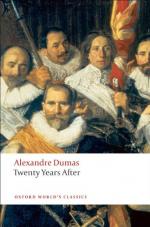“Ah, fie!” D’Artagnan replied. “Bigamy, my dear! Come now, you don’t really wish it?”
“But he is dead; I am sure of it.”
“He was a very contrary fellow and might come back on purpose to have us hanged.”
“All right; if he comes back you will kill him, you are so skillful and so brave.”
“Peste! my darling! another way of getting hanged.”
“So you refuse my request?”
“To be sure I do — furiously!”
The pretty landlady was desolate. She would have taken D’Artagnan not only as her husband, but as her God, he was so handsome and had so fierce a mustache.
Then along toward the fourth year came the expedition of Franche-Comte. D’Artagnan was assigned to it and made his preparations to depart. There were then great griefs, tears without end and solemn promises to remain faithful — all of course on the part of the hostess. D’Artagnan was too grand to promise anything; he purposed only to do all that he could to increase the glory of his name.
As to that, we know D’Artagnan’s courage; he exposed himself freely to danger and while charging at the head of his company he received a ball through the chest which laid him prostrate on the field of battle. He had been seen falling from his horse and had not been seen to rise; every one, therefore, believed him to be dead, especially those to whom his death would give promotion. One believes readily what he wishes to believe. Now in the army, from the division-generals who desire the death of the general-in-chief, to the soldiers who desire the death of the corporals, all desire some one’s death.
But D’Artagnan was not a man to let himself be killed like that. After he had remained through the heat of the day unconscious on the battle-field, the cool freshness of the night brought him to himself. He gained a village, knocked at the door of the finest house and was received as the wounded are always and everywhere received in France. He was petted, tended, cured; and one fine morning, in better health than ever before, he set out for France. Once in France he turned his course toward Paris, and reaching Paris went straight to Rue Tiquetonne.
But D’Artagnan found in his chamber the personal equipment of a man, complete, except for the sword, arranged along the wall.
“He has returned,” said he. “So much the worse, and so much the better!”
It need not be said that D’Artagnan was still thinking of the husband. He made inquiries and discovered that the servants were new and that the mistress had gone for a walk.
“Alone?” asked D’Artagnan.
“With monsieur.”
“Monsieur has returned, then?”
“Of course,” naively replied the servant.
“If I had any money,” said D’Artagnan to himself, “I would go away; but I have none. I must stay and follow the advice of my hostess, while thwarting the conjugal designs of this inopportune apparition.”




